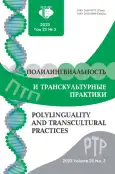Особенности социального билингвизма в России: чем он отличается в Татарстане и Якутии?
- Авторы: Михиенко А.1, Ощепкова Е.С.1,2, Ковязина М.С.1
-
Учреждения:
- Московский государственный университет имени М.В. Ломоносова
- Институт языкознания Российской Академии наук
- Выпуск: Том 20, № 3 (2023)
- Страницы: 456-471
- Раздел: Языковые процессы
- URL: https://journal-vniispk.ru/2618-897X/article/view/326682
- DOI: https://doi.org/10.22363/2618-897X-2023-20-3-456-471
- EDN: https://elibrary.ru/WCEHOJ
- ID: 326682
Цитировать
Полный текст
Аннотация
Россия всегда была поликультурной и многоязычной страной, поэтому во многих регионах сосуществует несколько официальных языков (помимо русского). Двуязычие имеет свои особенности в каждом регионе. Исследованы особенности двуязычия в Республике Саха (Якутия) и Республике Татарстан. Проведен анализ исторического фона миноритарных языков и современной языковой политики. Представлен обзор языковой ситуации с точки зрения языкового статуса и языкового использования миноритарных языков в системе образования. Выявлено, что, несмотря на схожую языковую политику, реальная ситуация в Татарстане и Якутии различна, особенно в плане предложений изучения миноритарного языка в школе. Сделан вывод о необходимости развития двуязычия в регионах и организации необходимой методической поддержки родителей и педагогов.
Ключевые слова
Об авторах
Анна Михиенко
Московский государственный университет имени М.В. Ломоносова
Email: mikhyenko@gmail.com
научный сотрудник 125009, Российская Федерация, Москва, ул. Моховая д. 11, стр. 9
Екатерина Сергеевна Ощепкова
Московский государственный университет имени М.В. Ломоносова; Институт языкознания Российской Академии наук
Автор, ответственный за переписку.
Email: oshchepkova_es@iling-ran.ru
кандидат филологических наук, научный сотрудник кафедры психологии образования и педагогики, факультет психологии, Московский государственный университет им. М.В. Ломоносова 125009, Российская Федерация, Москва, ул. Моховая д. 11, стр. 9; 125009, Российская Федерация, Москва, Б. Кисловский пер., д. 1, стр. 1
Мария Сергеевна Ковязина
Московский государственный университет имени М.В. Ломоносова
Email: oshchepkova_es@iling-ran.ru
член-корреспондент РАО, доктор психологических наук, профессор кафедры нейро- и патопсихологии, факультет психологии
125009, Российская Федерация, Москва, ул. Моховая д. 11, стр. 9Список литературы
- Zarate, G., D. Levy, and Kramsch, C. 2011. Handbook of Multilingualism and Multiculturalism. Paris: Archive Contam. Print.
- Hornberger, N., and S. McKay. 2010. Sociolinguistics and Language Education. Bristol, Blue Ridge Summit: Multilingual Matters. https://doi.org/10.21832/9781847692849 Institute of Multilingualism Home Page. Available online: https://centre-plurilinguisme.ch/en
- Edwards, J. 2007. Societal Multilingualism. Reality, Recognition and Response. In: Handbook of Multilingualism and Multilingual Communication. Ed. by Peter Auer, Li Wei. Berlin, New York: Mouton de Gruyter. Print.
- Simons, G.F., and C.D. Fennig (eds.) 2017. Ethnologue: Languages of the World, Twentieth edition. Dallas, Texas: SIL International. Print.
- Skutnabb-Kangas, T., and T. McCarty. 2008. Key Concepts in Bilingual Education: Ideological, Historical, Epistemological, and Empirical Foundations. Web. https://doi.org/10.1007/978-0-387-30424-3_112
- Jankiewicz, S., and N. Knyaginina. 2018. The Language of the Republic at School: Who Decides? SSRN Electronic Journal. Web. https://doi.org/10.2139/ssrn.3163596
- Jankiewicz, S., N. Knyaginina, and Prina, F. 2020. Linguistic Rights and Education in the Republics of the Russian Federation: Towards Unity through Uniformity, Review of Central and East European Law 45 (1): 59-91. doi: https://doi.org/10.1163/15730352-bja10003
- Hattori, S. 1979. The Place of Tatar among the Turkic Languages. Harvard Ukrainian Studies 3/4: 383-393. Web. http://www.jstor.org/stable/41035840
- Johanson, L. 2006. Tatar. In K. Brown (Ed.). Encyclopaedia of Language and Linguistics. 2nd Edition. Oxford: Elsevier. Print.
- Slavina, L., J. Mustafina, and Alan, M. 2017. Regional languages in cyberspace Case study: Tatarstan, Russia.Web.https://www.researchgate.net/publication/321420076_Regional_languages_in_cyberspace_Case_study_Tatarstan_Russia
- Marquardt, K.L. 2013. Language and Sovereignty: A Comparative Analysis of Language Policy in Tatarstan and Kazakhstan. 4. Los Angeles, CA: UCLA Asia Institute. http://www1.international.ucla.edu/media/files/Marquardt_PoCA_4-fj-lrh.pdf
- Wigglesworth-Baker, T. 2016. Language Policy and Post-Soviet Identities in Tatarstan. Nationalities Papers 44 (1): 20-37. https://doi.org/10.1080/00905992.2015.1046425
- Suleymanova, D. 2009. Language Situation in the Republic of Tatarstan. Info Islam 1-16. http://www.info-islam.ru/publ/statji/jazykovaja_situacija_v_respublike_tatarstan/5-1-0-11281
- Graney, K. 2007. Making Russia Multicultural Kazan at Its Millennium and Beyond. Problems of post-communism 54 (6): 17-27. Print.
- Nizamova, L.R. 2016. Ethnic Tatars in contention for recognition and autonomy: bilingualism and pluri-cultural education policies in Tatarstan, Nationalities Papers 44 (1): 71-91. https://doi.org/10.1080/00905992.2015.1124076
- Gorenburg, D. 2005. Tatar Language Policies in Comparative Perspective: Why Some Revivals Fail and Some Succeed. Ab Imperio 257-284. Web. 10.1353/imp.2005.0023.
- Minzaripov, R.G. 2013. Ethnicity and Migrations in Modern Tatarstan. Kazanʹ: Magarif publ. Print. (In Russ.).
- Iskhakova, Z., R. Musina, and Minullin, K. 2002. Language and ethnicity at the turn of the century. Kazan: Magarif publ. Print. (In Russ.).
- Kuzmin, E. 2014. Multilingualism in Russia. In: Linguistic and Cultural Diversity in Cyberspace. Proceedings of the 3rd International Conference (Yakutsk, Russian Federation, 30 June - 3 July, 2014). Moscow: Interregional Library Cooperation Centre, 2015, p. 30-42. Available at: < http://www.ifapcom.ru/files/2015/khanty/yak_mling_2015.pdf>
- Ufimtseva, N.V. 2020. Association-verbal network as a model of the linguistic picture of the world. European Proceedings of Social and Behavioural Sciences 86: 169. Print. (In Russ.).
- Grosjean, F. 2015. Bicultural bilinguals. International Journal of Bilingualism 19 (5): 572-586. Print.
- Veinguer, A., and H. Davis. 2007. Building a Tatar elite: Language and national schooling in Kazan. Ethnicities 7 (2):186-207. Web. http://www.jstor.org/stable/23889434
- Haarmann, H. 1986. Language in Ethnicity: A View of Basic Ecological Relations. Berlin: Mouton de Gruyter. Print.
- Tovar-García, E.D., and E. Podmazin. 2018. The impact of socioeconomic status and population size on the use of the Tatar language at home. Intercultural Education 29 (1): 122-138. https://doi.org/10.1080/14675986.2017.1404740
- Bayramova, L.K. 2001. Tatarstan: language symmetry and asymmetry. Kazan: Izd-vo Kazan. un-ta publ. Print. (In Russ.).
- Bhatia, T., and W. Ritchie. 2006. The handbook of bilingualism. Oxford: Wiley-Blackwell. Print.
- Alòs i Font, H., and E.D. Tovar-García. 2015. Factors affecting the knowledge of the chuvash language amongst school students in Russia. Sociolinguistic Studies 9 (4): 345-372. https://doi.org/10.1558/sols.v9i4.26771.
- Tishkov, V., V. Stepanov V., Funk, D., and O. Artemenko. 2009. Status of and Support for Linguistic Diversity in The Russian Federation. Expert report. Moscow: Institute of Ethnology and Anthropology of the Russian Academy of Sciences. Available at: https://refdb.ru/look/1274797.html
- Álvarez Veinguer, A. 2013. Mutual Understanding in Tatarstan? Teachers’ and Pupils’ Attitudes to Tatar and Russian in Tatar and Non-Tatar Gymnásias. Pragmatics and Society 4 (2): 240-257. https://doi.org/10.1075/ps.4.2.07alv.
Дополнительные файлы









